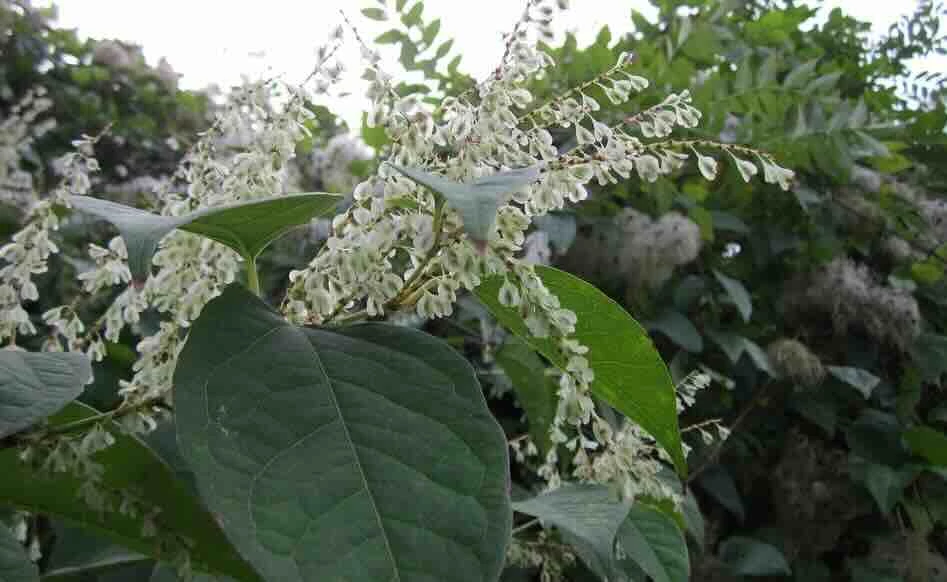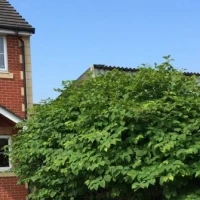
Japanese Knotweed Specialist in Poynton
Get in touchAt Japanese Knotweed Specialist, we identify and remove Japanese knotweed in Poynton SK12 1.
Our team of certified professionals is committed to delivering high-quality services to protect your property from the destructive impact of this invasive plant.
We value our customers, prioritise environmental sustainability, and uphold our promise of excellence in our service.
Japanese knotweed, also known as Asian knotweed, can damage buildings. The roots can even grow through hard surfaces such as tarmac. If you identify this invasive, non-native plant within your grounds, it is recommended that you have it sorted as soon as possible to avoid further damage.
Our professional team of Japanese Knotweed specialists can offer top-quality control and removal services to rid your home or workplace of the plant and prevent its return.
If you want more information about our services, please use the enquiry form on this page or call the number above.
We'll be able to answer any questions or queries you have about the knotweed plant and, if necessary, offer a free quotation for its removal or identification.
What is Japanese Knotweed?
Japanese Knotweed (Fallopia Japonica) is an invasive plant species among the world's worst invaders. This aggressive plant threatens biological diversity and disrupts human activities, making its rapid removal essential for anyone who finds it near their property.
Knotweed grows through solid surfaces like concrete flags, block paving, and tarmacadam. If left untreated, it can penetrate cavity walls, causing significant damage to homes and workplaces. The plant also damages boundary walls, leading them to collapse if not promptly managed.
Japanese Knotweed exploits cracks in concrete surfaces, growing through and potentially causing extensive damage. Although it cannot penetrate solid concrete, its roots find weaknesses, exacerbating the problem.
For detailed information on Japanese Knotweed and the potential damage it can cause, please get in touch with our team by filling out the contact form provided. A specialist will respond promptly to address your concerns and provide expert guidance.
Specialist Japanese Knotweed Services Poynton
Our team is ready to assist you if you're searching for a local Japanese Knotweed Specialist in Poynton.
Our Services Include:
Japanese Knotweed Identification in Poynton: Conduct detailed surveys to determine the extent of the infestation.
Japanese Knotweed Removal in Poynton: using certified herbicides or mechanical excavation methods to eliminate the plant.
Japanese Knotweed Disposal: Adhering to controlled waste guidelines for safe and legal disposal.
Our experts are strategically located nationwide to provide quick and efficient identification and removal services wherever needed.
Get in touch today to book a knotweed survey.
Contact Us for More Information
Why Choose Our Poynton Knotweed Specialists?
Expert Identification: Our specialists accurately identify Japanese knotweed infestations to prevent misdiagnosis and unnecessary treatments.
Comprehensive Treatment: We use regulated herbicides, eco-friendly methods, and mechanical excavation to eradicate Japanese knotweed.
Professional Management: We offer tailored management plans, including continuous monitoring and preventative strategies.
What does Japanese knotweed look like?
Here are the tell-tale signs to look out for when you believe you may have a knotweed problem:
Red Shoots: New growth appears as red or purplish shoots emerging from the ground in early spring.
Heart-Shaped Leaves: The leaves are bright green, heart- or shovel-shaped with a pointed tip and arranged in a zigzag pattern along the stems.
Hollow Stems: The stems resemble bamboo, with visible nodes and a hollow, green or reddish-brown interior.
Creamy-White Flowers: Clusters of small, creamy-white flowers bloom in late summer to early autumn.
Rapid Growth: The plant can grow up to 2-3 metres tall in a single season, forming dense thickets.
Leaves Turning Yellow: Leaves may turn yellow and die in late autumn.
Canes Turning Brown: Stems become woody and turn brown during winter, remaining upright.
Rhizomes: Extensive underground root systems, known as rhizomes, spread horizontally and can cause damage to structures.
If you notice any of these signs, contact a specialist immediately for proper identification and treatment to prevent further spread and damage.
Protect Your Property with Knotweed Management in Poynton
Our team provides a comprehensive Japanese Knotweed Management Plan tailored to your property's needs.
We utilise chemical control or install root barrier membranes to prevent regrowth. Engaging professionals for effective removal is vital, as improper handling can result in the plant returning.
Knotweed Treatment Near Me
We provide professional knotweed weedkiller treatment in Poynton SK12 1 and surrounding areas to prevent the plant from regrowing after removal.
At Japanese Knotweed Specialist, our experts, with years of experience in the industry, know how to eliminate unwanted weeds and protect your property from damage.
We use specialised treatments that are proven to be effective. While other contractors may offer cheaper services, their methods may fail, leading to the plant's return and potential property damage.
Our specialists ensure the complete removal of knotweed, giving you peace of mind that the plant will not return.
For more information about our knotweed treatment, please use the form provided to contact us directly. We will respond promptly with all the details you need.
What is the Cost to Treat Japanese Knotweed in Poynton?
Japanese Knotweed treatment costs range from £2,200 to £7,000 in Poynton, depending on the size of the affected area and required treatment methods.
Our knotweed surveyors first identify the knotweed infestation and then provide a price quote based on the extent of the issue and the treatment needed to eradicate it.
Insurance Backed Guarantee in Poynton
We provide a 10-year, £5 million warranty on our eradication services, with additional insurance-backed guarantees to cover total contract value and property damages.
Where Did Japanese Knotweed Originate?
Japanese Knotweed (Fallopia Japonica) originated in Japan, Korea, East Asia and China. The botanist Philipp von Siebold introduced the plant to the United Kingdom in 1850. It gained popularity during the Victorian era for its ornamental beauty, earning the title of "the most fascinating new ornamental plant of the year" by the Society of Agriculture and Horticulture in Utrecht in 1847.
What Problems Does Japanese Knotweed Cause?
Japanese Knotweed creates problems by crowding out native vegetation, reducing biodiversity, and affecting ecosystems. Its aggressive root system can penetrate and damage structures, such as homes, garden walls, fences, and buildings, by exploiting cracks and mortar joints. The pressure from developing rhizomes can cause severe structural damage over time.
How Can You Permanently Remove Japanese Knotweed?
Permanently removing Japanese Knotweed involves using glyphosate-based herbicides, which have proven the most effective. However, different herbicides containing glyphosate may vary in effectiveness.
For professional advice on the best solutions for treatment and removal, please use our contact form.
Can You Mortgage a House with Japanese Knotweed?
Mortgaging a house with Japanese Knotweed is possible, but lenders may be cautious about properties affected by this invasive plant. The plant poses risks due to potential structural damage and resale issues, making it a less favourable asset for a mortgage.
What Is the Property Care Association?
The Property Care Association (PCA) is a trade organisation representing experts in building-related issues. The PCA promotes high professional and technical standards within the property care industry, including Japanese Knotweed management.
What Is an Insurance-Backed Guarantee?
An Insurance Backed Guarantee (IBG) for Japanese Knotweed Removal covers liabilities if the specialist providing the guarantee cannot fulfil the contract due to insolvency. This guarantee offers peace of mind, ensuring the agreed-upon services will be completed.
Contact Our Poynton Team Today
Contact our expert team for more information on Japanese Knotweed and how it can affect your property.
We are here to answer your questions and provide a free quote for identification and removal services. Please fill out our contact form or call us today to take the first step towards protecting your property from this invasive species.
We cover Poynton (Cheshire)
Get in touch
Skip to
Gallery

